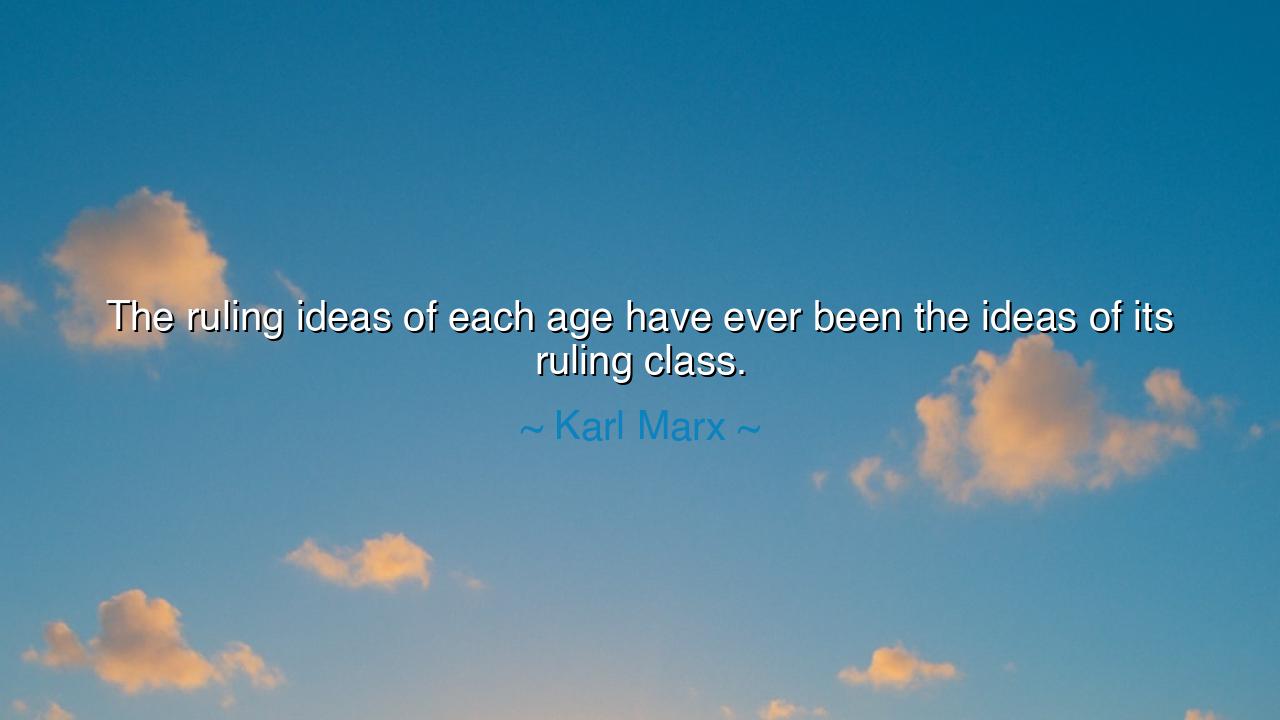
The ruling ideas of each age have ever been the ideas of its






In the vast currents of history, the ideas that shape each age are often not the product of universal consensus or divine revelation, but rather, the dominant forces of society—the ruling class—whose interests, power, and influence mold the thoughts, beliefs, and values of the time. Karl Marx, a towering figure in the study of social and political change, declares: "The ruling ideas of each age have ever been the ideas of its ruling class." These words resonate with a profound truth—that the ideologies we hold as truth are often shaped and propagated by those who control the means of production, not necessarily by what is truly just or right for all people. In every age, the ruling class, those who hold economic, political, or military power, determine the values, the beliefs, and the philosophies that are passed down to the rest of society.
The ancients were keenly aware of the power of ideas and how they could be used to shape the world. Plato, in his dialogues, spoke of the role of philosophy in creating a just society, but he also understood that in every society, there were those who controlled the narratives that shaped the masses. He wrote in his work, The Republic, about the philosopher-kings who would rule with wisdom, as opposed to tyrants who would use their power to enforce their own beliefs and ideas. The philosopher-king, Plato believed, would be the rare ruler who could transcend the interests of the ruling class and seek the common good. Yet, in most societies, the ruling class's ideas became the dominant ideologies, often perpetuating systems that served their interests, while marginalizing the voices and needs of the oppressed.
Consider the story of the Roman Empire, whose ruling class—the patricians—held a monopoly on political power and wealth. They shaped the Roman ideology, teaching the masses that gladiatorial combat was entertainment, that the expansion of their empire was justified by divine will, and that the vast inequality between the patricians and plebeians was simply the natural order. The ruling class of Rome determined what was considered virtuous and honorable, even as they maintained a system that was brutal for the lower classes. Slavery, poverty, and the subjugation of women were accepted as part of this order. It was not until voices from outside the ruling class, such as the early Christians, began to challenge the Roman order, that a new set of ideas slowly took root, challenging the values that the ruling elite had long imposed.
The same is true in the modern era. Consider the rise of capitalism in the 19th century, a system that has profoundly shaped our world today. The industrial revolution, driven by a small group of industrialists and entrepreneurs, brought about immense change, but also entrenched massive inequality. The ruling class—those who controlled the factories and the wealth—shaped the ideas of the time. They told the working class that the system was just, that the inequalities were the result of individual effort, and that hard work would always lead to success. Meanwhile, the voices of the workers, who lived in squalor and often worked under dangerous conditions, were dismissed. The ruling ideas were those that perpetuated the dominance of the rich, keeping them in power, while justifying the suffering of the poor.
In our own lives, it is important to understand that the ideas we are taught and the values we uphold are often not the result of a universal truth, but of the influences of the dominant class in society. These ideas may seem natural or self-evident, but they are shaped by those with power. Whether it is in the form of media, politics, or education, the ruling class sets the agenda for what is considered acceptable, moral, or just. The lesson here is to remain critical of the narratives that dominate our societies and to seek out the voices and perspectives that are often marginalized or silenced by those in power.
The lesson from Marx’s words is a call to action and awareness. We must not passively accept the dominant ideas of our age without questioning them. We must challenge the status quo, especially when it serves the interests of the few at the expense of the many. History is filled with examples of those who have risen up against the ideas of the ruling class—whether it be slave revolts, women’s suffrage movements, or civil rights struggles—and changed the course of history. Change is often driven by those who dare to challenge the dominant narrative, to push back against the ideologies that justify inequality and oppression.
Let us then, in our own time, be aware of the ideas we embrace and ask ourselves: Who benefits from these ideas? Are they the ideas of the powerful, or do they serve the common good? Just as the ancients recognized, we too must ensure that our ideas are not merely a reflection of the ruling class, but that they are rooted in justice, equality, and truth. We must look beyond the surface, beneath the layers of propaganda and dominant narratives, to find the real forces at work in our world, and work toward a society where the ideas of the many are as valued as those of the few. In doing so, we will not only honor the lessons of history, but we will shape a better future for all.






AAdministratorAdministrator
Welcome, honored guests. Please leave a comment, we will respond soon